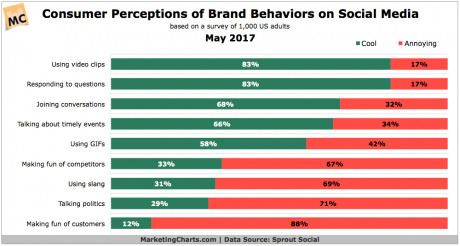Consumers seem to have fairly clear ideas about brand personalities on social media, and the use of slang isn’t… woke. In a new study from Sprout Social, roughly 1,000 US social media users weighed in on brand personalities, with most feeling that it’s “cool” if brands talk about timely events, but not politics. (In related news, consumers aren’t that interested in brands taking public stances in on social issues.)
Meanwhile, respondents are most accepting of the use of video clips (83% seeing this as “cool” rather than “annoying”), though the exploding use of GIFs – which brands starting incorporating in their emails back in 2013 – isn’t met with quite as much fervor (58% approving as “cool”).
It stands to reason that most would be happy with brands responding to questions, although separate data from the report suggests that only about one-third of consumer messages on social media in Q1 that needed a response actually got one…
Behaviors that more social media users see as “annoying” than “cool” include:
Making fun of competitors (67% annoying) and customers (88%);
Using slang (69%);
and Talking politics (71%).



 Your new post is loading...
Your new post is loading...









Not cool? Consumers have a message for brands.